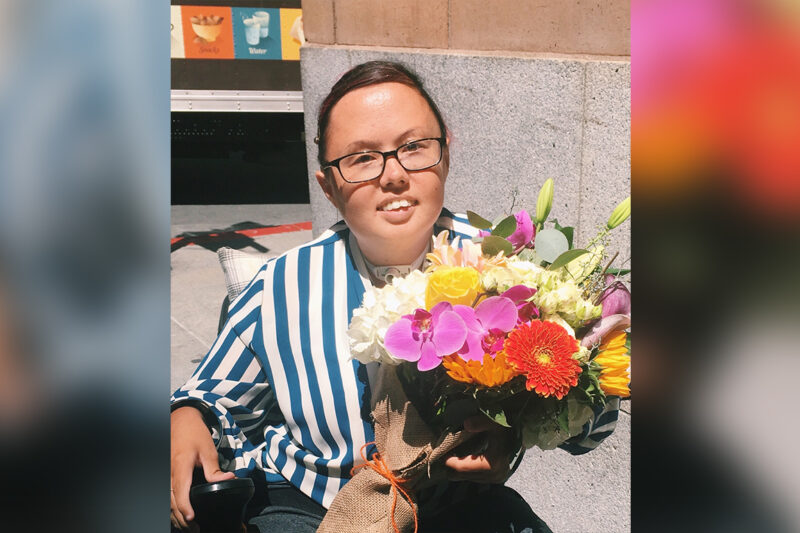
Today the Senate introduced a modified version of the bill to repeal Obamacare and gut Medicaid. The new version still severely impacts people with disabilities’ independence and quality of life. Here is one story.
When I'm not telecommuting, I work in the San Francisco Financial District in human resources. I am also politically active and enjoy hiking. I am totally the friend who is always trying to recruit you into something, whether it's a double date, to do something on your bucket list, or to go to a protest.
I am 30 years old and have a significant disability. I rely on attendants and nursing care for at least 16 hours a day. I have a tracheostomy and come with my own “Barbie accessories”: wheelchair, ventilator at night, and other devices. Attendants come to my home or workplace throughout the day to help me with all activities of daily living. These part-time workers assist me with personal care, medical care, cooking, housekeeping, and driving me different places in my car.
I am able to receive these services through a Medicaid waiver, a program that provides nursing home-level services to people with disabilities who need them while living at home in their community. Though I work and have robust insurance coverage through my company, private insurance does not cover the services I need. I am able to access these services by purchasing Medicaid through a California program for working people with disabilities.
Historically, people who needed attendant and nursing care would need to have this care provided solely by their family, a group home, or an institution. Community-based services became available because advocates argued that people with disabilities should not have to live in an institution to receive services that could be provided at home or in other community-based settings. They argued that we had a civil right to receive services in a less restrictive environment –and the Supreme Court agreed.
The programs themselves are not perfect. Most Medicaid waivers have a waiting list that is years long. And in many states, like California where I live, the reimbursement rates have not been updated in decades. It is very challenging to find and retain home nurses. At the same time, these programs are imperative for many people with disabilities like me. These services make it possible for me to live independently, work, and have the same basic quality of life everyone deserves.
Right now, Medicaid is under attack through legislation that would repeal the Affordable Care Act and cap and cut federal Medicaid funding. According to the nonpartisan Congressional Budget Office, the Senate bill that is now under consideration would slash $772 billion from Medicaid over the next 10 years. I know what the impact of these changes will be.
I lived for 24 years in North Carolina, where I received a lot less government support for services. I had to live at home with my family, and I relied on them for full-time help. They made sure I had everything and were absolutely loving in their care for me. At the same time, when your family is tired from providing constant support, that has a big impact on your life. And because I had a job that let me work from home, I ended up living most of my life online through a computer.
I started to stay home more and more, to the point where I realized I was very depressed. Outside of occasional doctor’s appointments, I hadn't really left the house in almost three months. A friend with a similar disability who lived in Berkeley invited me to visit her.
That trip changed my life.
I saw my friend do things that I didn't really get to do a lot back home. Things like shop in a grocery shop, cook, garden, go to art openings, or go for ice cream. I wanted to do these things, too. Seeing her live on her own with the support Medicaid offered in the state of California made me want to move to the Bay Area instantly.
Most people won't be able to move to states with more generous programs, and no state will be left unscathed by the proposed changes to Medicaid. In fact, one out of two people with disabilities live in poverty. The quality of life for people with disabilities greatly decreases when our only options are to rely on support from our families and friends or to go into an institution like a nursing home. People with disabilities are already vulnerable, frequently subject to domestic violence from family members and others. It is terrifying to think about what is going to happen with these cuts.
I want to encourage everyone to call your members of Congress and tell them you won’t stand for cuts to Medicaid. As a society, we have made so much progress over the last 20years for people with disabilities. I don't want to imagine me and my friends confined to live in nursing homes.
Stacey Milbern is a human resources professional at a major bank and a long time disability rights activist. She lives and works in the San Francisco Bay Area.


